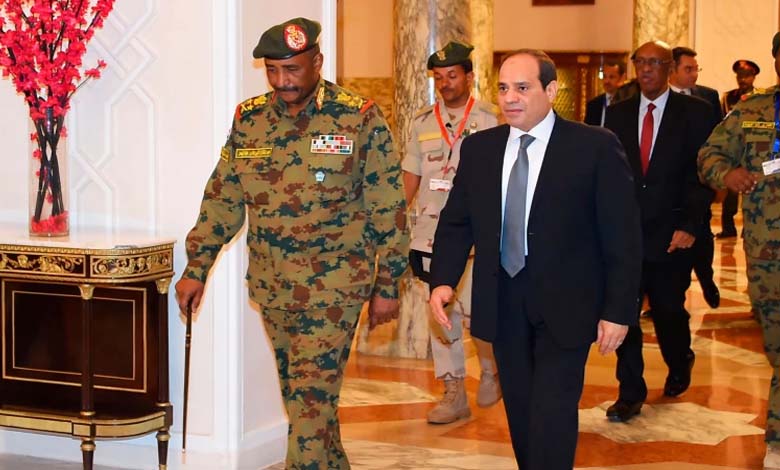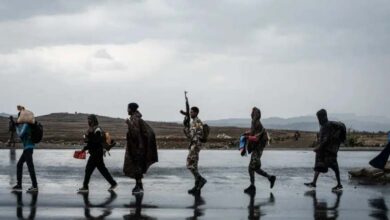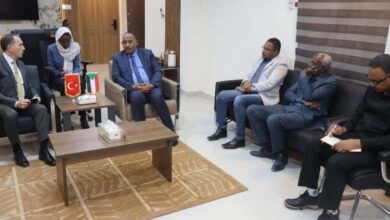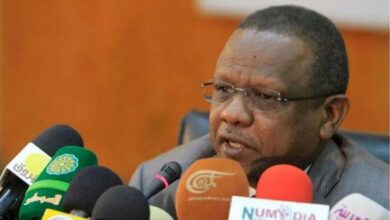Egypt intercepts civilians fleeing the conflict in Sudan

Human Rights Watch stated that the decision of the Egyptian government in June 2023 to impose entry visas for all Sudanese restricts the access of women, children, and the elderly fleeing conflict in Sudan to safe places. The impact of the new instructions, in addition to previous instructions requiring Sudanese males aged 16 to 49 to obtain a visa, implemented without ensuring the swift processing of visas, violates international standards by unreasonably delaying asylum requests and threatening lives.
The Egyptian authorities claimed that the new entry visa law would curb visa forgery. Until late June, thousands of displaced persons were stranded in deplorable humanitarian conditions while attempting to obtain a visa from the Egyptian consulate in Wadi Halfa, Sudan, near the Egyptian border. Some had to wait for a month, struggling to secure food, shelter, and healthcare.
Amr Magdi, a senior researcher in the Middle East and North Africa division at Human Rights Watch, stated, “The necessity of combating visa forgery does not justify Egypt’s refusal or delay in allowing those fleeing the serious conflict in Sudan to enter. The Egyptian government should cancel entry visa procedures for Sudanese citizens during the current crisis, allow them to enter swiftly, and facilitate asylum procedures or treatment for most, if not all, as refugees.”
Since the start of the fighting in Sudan in April, more than 2.7 million Sudanese, 2.2 million within Sudan, and about 500,000 to neighboring countries have been displaced. Egypt has received more than 250,000 Sudanese, according to the United Nations High Commissioner for Refugees (UNHCR), in addition to about two to five million Sudanese who were in Egypt before the conflict. The UNHCR, which registers asylum seekers and determines refugee status on behalf of the government, reported that 77,000 Sudanese were registered as refugees or asylum seekers until June.
Between May and June, Human Rights Watch met five Sudanese citizens – one man and four women, all unregistered asylum seekers – who entered Egypt in May before the new visa instructions. Two Sudanese men in Wadi Halfa applied for an Egyptian entry visa in May and June, and three leaders of the Sudanese community in Egypt residing in Cairo and Giza.
Mohammed Ibrahim (21 years old), a Sudanese engineering student, stated that he was able to extend his expired passport at the Sudanese immigration office in Wadi Halfa in May. However, the Egyptian consulate rejected his document and left him stranded there after the rest of his family entered Egypt. He is still waiting, stating that he cannot obtain a new passport because the main immigration office in Khartoum has stopped working during the conflict.
Under current Egyptian rules, Sudanese can apply for an entry visa from two Egyptian consulates, in Wadi Halfa and Port Sudan, in eastern Sudan. Hundreds or even thousands of Sudanese have arrived at the two consulates seeking entry visas, causing strain on the consulates and leading to longer-than-usual waiting periods for visas, according to the independent Sudanese news site “Dabanga.” In late May, it was reported that the Port Sudan consulate issued only 20 visas per day.
On June 10th, a spokesperson for the Egyptian Ministry of Foreign Affairs stated that Egypt had introduced new instructions requiring all Sudanese citizens to obtain entry visas, including women, children, and elderly men, who were previously allowed to enter without a visa. The ministry justified the requirements, claiming the need to prevent “illegal activities carried out by individuals and groups on the Sudanese side of the border, forging entry visas to Egypt for profit.”
Until June 16th, the new visa instructions forced thousands of civilians, including children, many of whom came from the capital, Khartoum, to remain stranded in extreme heat at the border crossings between Egypt and Sudan, according to the media. Egypt made no clear effort to increase the capacity to expedite Sudanese visas. Two individuals applying for entry visas at the Wadi Halfa consulate told Human Rights Watch that the consulate operates only four hours on some days, making it extremely difficult for applicants to submit their passports.
Even before Egypt tightened legal restrictions on visas, previous procedures prevented men and boys from obtaining protection and separated many from their family members who managed to cross into Egypt without a visa.
Then, in May, the Egyptian authorities began tightening and enforcing conditions. The independent Egyptian media site “Mada Masr” reported that authorities no longer accept extended passports or temporary travel documents for visa applications and ceased recognizing children listed on their parents’ passports.
As a result, many displaced Sudanese who lost or couldn’t renew their passports during the war are unable to apply for Egyptian visas. Practically, these excessive restrictions, along with new visa instructions, have deprived thousands of Sudanese refugees of international protection.
Ibrahim stated that many visa applicants sleep in the streets, mosques, or schools due to a significant increase in accommodation prices. He pointed out that the sole hospital in Wadi Halfa is unable to meet the medical needs of many, and the town is facing shortages of essential medical supplies and medications like insulin.
Humanitarian aid in Wadi Halfa largely focuses on basic food supplies, mostly provided by local non-governmental organizations, with some assistance from the World Food Programme.
On May 5th, the UN Refugee Agency urged all countries to allow civilians fleeing from Sudan, including those without identification documents, to access their territories without discrimination. The agency also advised countries to recognize that those fleeing Sudan due to conflict may need international protection granted to refugees.
Denying asylum seekers entry at borders or any entry point violates the right to seek asylum under the “Universal Declaration of Human Rights.” Forcing Sudanese to return to Sudan may also violate the principle of non-refoulement under the 1951 UN Refugee Convention, the 1969 Organization of African Unity Convention Governing the Specific Aspects of Refugee Problems in Africa, and the 1969 Convention Against Torture, to which Egypt is a party.
The principle of non-refoulement prohibits governments from forcibly returning anyone to a country where they face persecution, torture, or other irreparable harm. According to the Organization of African Unity Refugee Convention, the refugee status may include individuals forced to seek refuge outside their country due to “events seriously disturbing public order.”
The European Union, a major donor to Egypt, provides financial support to assist refugees and asylum seekers in the country, as well as to curb irregular migration to and through Egypt – two goals that may conflict. Those fleeing their countries seeking international protection may be forced to migrate irregularly or without
adequate documents. Under the 1951 Refugee Convention, they should not be punished or returned to their countries.
However, unless due human rights diligence is exercised, EU funding earmarked for border monitoring may assist Egypt in continuing to restrict entry from Sudan or deporting Sudanese with irregular status, despite the risks people face in Sudan.
In October 2022, the European Union approved €80 million in funding for Egypt to enhance the operational capacity of coastal and border guard forces to deal with migration flows. The “Euro-Mediterranean Human Rights” reported that cooperation in border management between the European Union and Egypt lacked a comprehensive mechanism for monitoring human rights over the past few years.
In 2023, the European Union allocated €5 million as humanitarian aid for education, basic needs, and protection for the general refugee population in Egypt, in addition to €20 million for newcomers from Sudan, covering food, water, sanitation, and hygiene materials.
The United States, another donor, announced that it would provide $6 million to Egypt to meet the increasing humanitarian needs arising from the ongoing crisis in Sudan.
Majdi stated, “Donors to Egypt and their supporters should ensure that Egypt respects people’s right to seek asylum from the conflict in Sudan and receives sufficient support to meet their basic needs once they cross into Egyptian territory.”












